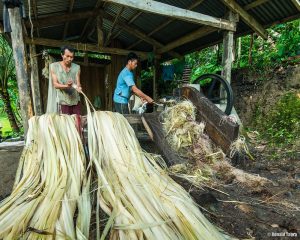Biodegradable masks in the Philippines
A Filipino company develops biodegradable sheet fiber masks. An initiative that matches the environment and health.
“Coronavirus waste”.
In the COVID period, it is not uncommon to see N95 masks and latex gloves in the streets, on the beaches, and in the countryside. Environmentalists call them “coronavirus waste”. The UN estimates that 75% of the plastics used to protect against coronavirus inevitably become waste. Most of this is in addition to the 8 million metric tons of plastic already in the oceans. At this rate, researchers project that there will be more plastic than fish in the ocean by 2050.
In addition, the health crisis has overshadowed the climate emergency, and the supply of masks has supplanted government efforts to eliminate single-use plastics.

Filipino solution
A company based in the Philippines, Salay Handmade Products Industries Inc. has developed a biodegradable mask made of abaca sheet fiber. This tree cousin to the banana tree is appreciated for its high water resistance and rigidity, as much as polyester. Masks made of abaca fiber decompose in nature in two months.
The use of abaca has spread throughout history. First made into a solid paste to protect cargo in the 19th century, it is now used in tea bags, bank bills, paper, and even in Mercedes cars. Its water resistance and natural particle filter meet international criteria for effective masks.
At the moment, its only defect is its price, which is much more expensive than a standard single-use surgical mask. However, the Philippines, which accounts for 85% of the global supply of abaca, is counting on strong demand. 10% of its production is focused on the medical use of these fibers, and factories are doubling their production. Logical, since the surrounding countries are taking a close interest in the initiative, as are Chinese, Indian, and Vietnamese manufacturers. Thus, if the demand for abaca increases, its price may quickly decrease. If all countries decide to reconcile health and environmental protection, abaca masks could become the new standard.
Sources: europeansting, Oceanasia, Bloomberg
Credits: cover photo @TYRATOYADO/Twitter; picture: processing abaca fibers, Philippines, Ronald Tagra/ Creative Commons
Encourage us if you like positive stories!





